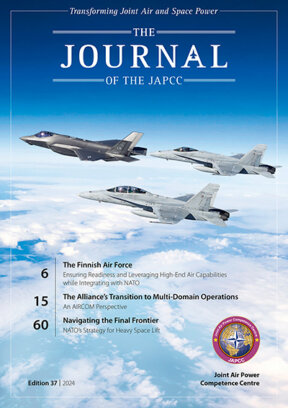Editorial
I am delighted to present the latest edition of the JAPCC Journal. This issue showcases a diverse collection of articles focussing on concepts important to NATO. But first, we must acknowledge the ongoing large-scale conflict in continental Europe, where Ukrainians continue to demonstrate unwavering resilience in the face of relentless Russian aggression. As the conflict enters its third year, the importance of NATO unity to ensure regional security cannot be overstated. In order to gain a comprehensive understanding of the current landscape, it is crucial to analyse developments from this conflict as well as emerging concepts and trends within the Alliance. In this journal, our esteemed authors draw upon their unique expertise and experiences to provide valuable insights into various relevant topics shaping the future of NATO.
We begin this issue with a captivating article by Major General Juha-Pekka Keränen, Commander of the Finnish Air Force. He introduces us to the robust capabilities that our new NATO member offers to the air domain. Following this, we expand our view to showcase how Allied Air Command tackles multi-domain operations as a functional component command. This piece melds the concepts of MDO with the Command’s five priorities and offers astute interpretations of how to best synchronize the principles of MDO with military and non-military instruments of power. Next, we dive into the benefits and limitations of emerging and disruptive technologies, by examining practical applications for quantum technology. Following this, we examine possibilities for electrifying aviation. Moving on, the journal explores the future of airborne surveillance and C2 by leveraging a systems-of-systems approach to achieve Alliance Future Surveillance and Control.
We then continue with viewpoints from Allied Air Command on their lessons learned from the Ukraine crisis, and how the warfare transitioned into land engagements when air superiority was not achieved by either side. The next article provides an analysis of space launch capabilities with a proposed strategy of how a diversified and resilient space industry can help NATO achieve robust heavy space lift. We then shift focus back to emerging and disruptive technologies, specifically what artificial intelligence can bring to the fight through large language models focused on the air domain. The journal then concludes with highlights of the JAPCC’s 2023 Conference, covering wide-ranging topics from space domain awareness to partnerships, logistics, interoperability, and much more.
Thank you for taking the time to explore this recently redesigned journal. I would like to express my sincerest gratitude to all of our contributing authors. Furthermore, our reader’s valuable feedback is essential in helping us enhance and advance the discussion on the transformation of Joint Air and Space Power. We encourage you to visit our website at www.japcc.org, follow us on LinkedIn or (Twitter) X, or email us at .
Paul Herber
Air Commodore, NE AF
Assistant Director, JAPCC








